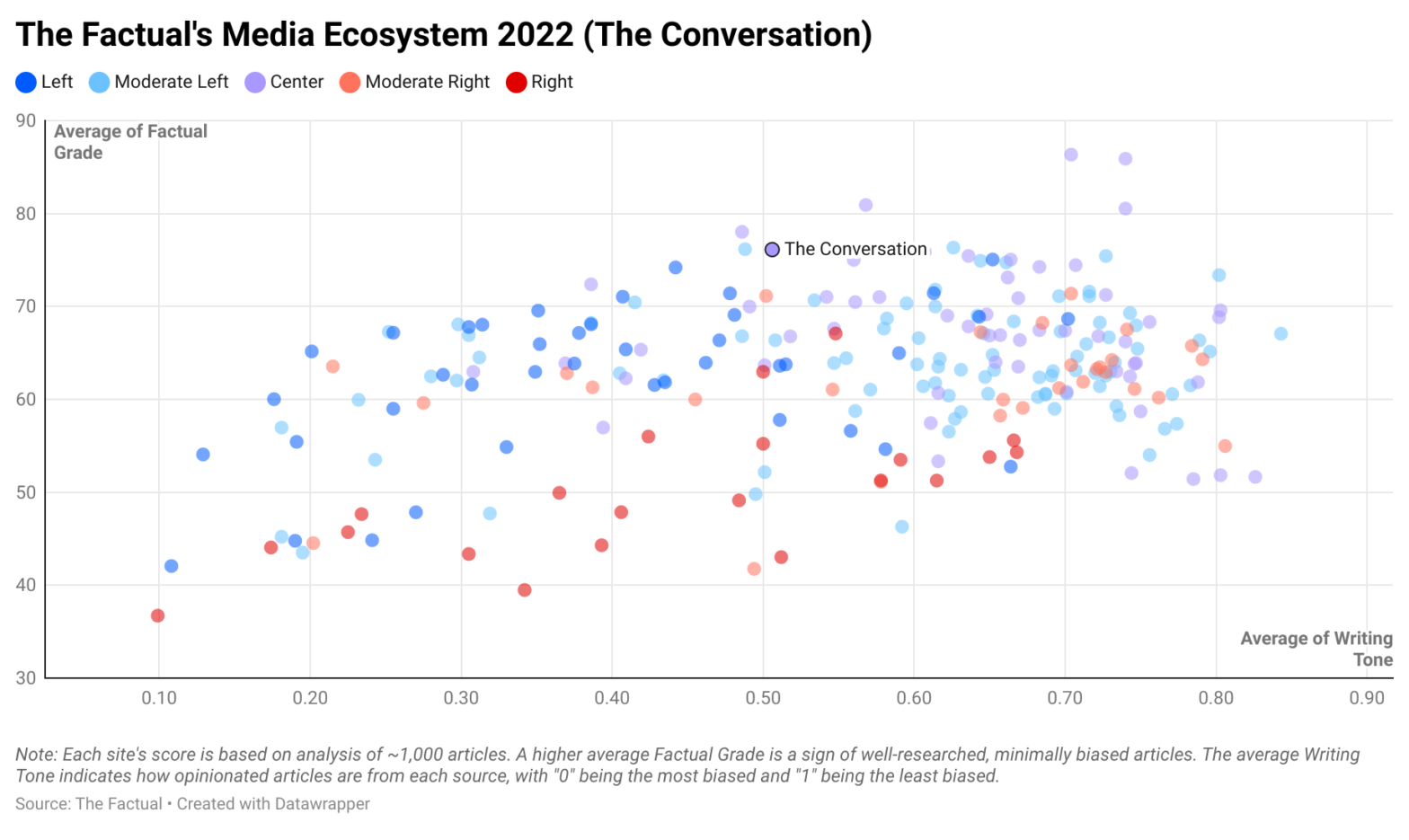The Conversation is a not-for-profit news organization that commissions academic authors to publish accessible analysis on trending topics. The site has a unique publishing model, as it relies exclusively on academic authors and the site’s editors to develop timely, incisive journalism. Given the site’s rapid expansion, this article examines The Conversation’s publishing output to assess its reliability, opinionatedness, political bias, and ownership.
How Does The Factual Rate News Sources?
The Factual analyzes more than 10,000 news stories every day to help readers find the most informative, least-biased articles. Our news-rating algorithm scores each article along four metrics: (1) cited sources and quotes, (2) publication history, (3) writing tone, and (4) author expertise. These scores combine in a weighted average we call a Factual Grade, which ranges from 0–100%. (See our How It Works page to learn more about our algorithm.)
For this study, we analyzed ~1,000 articles each from 240 news sources. The average Factual Grade for the entire dataset was 62.5%. Based on these averages, we can compare the performance of news sites across the media ecosystem. The entire dataset can be explored in greater detail here.
How Factual Is The Conversation?
The Conversation scored an average Factual Grade of 76.1%, placing the site in the 97th percentile of the dataset. In fact, The Conversation had the 8th-highest score of all sites that we analyzed. These high scores can be attributed in particular to high-quality evidence in most of the site’s articles. The Conversation relies on academics to write articles for the site, who tend to incorporate comprehensive, highly factual sources in their writing.
Like any news source, scores from The Conversation varied widely based on factors like author expertise and cited evidence. For example, some scored above 90%, while others scored below 60%.
Please check your email for instructions to ensure that the newsletter arrives in your inbox tomorrow.
How Opinionated Is The Conversation?
One of the metrics The Factual uses is the Writing Tone, which measures how opinionated the writing is in an article. For this metric, the algorithm looks for signs of subjective commentary (e.g., first person pronouns and unnecessary adverbs), as well as the emotional nature of selected words, and sees how prevalent they are for a given length of text. More neutral text receives higher ratings, with “0” being the most opinionated and “1” being the most neutral.
The Conversation had an average Writing Tone score of 0.50, placing it in the 30th percentile in our dataset for this metric. This suggests that articles from the site are often highly opinionated in their writing tone. This can partially be explained by the site’s approach, which focuses on academics making persuasive arguments on timely topics, not simply presenting the news. Such opinionated writing can be seen through article titles such as “Boris Johnson: a terminal case of hubris syndrome” and “Military history is repeating for Russia under Putin’s regime of thieves.”
What Is The Conversation’s Political Bias?
The Factual classifies news sites by political bias as either Left, Moderate Left, Center, Moderate Right, or Right. This classification comes from third-party assessments from media bias organizations such as AllSides and Media Bias/Fact Check (MBFC). Based on this data, The Factual assigns a “Center” bias.
MBFC categorizes The Conversation as “Least Biased,” it’s centrist bias classification. They note that the site covers topics on both the center-right and center-left. The Conversation also gets full credit for highly factual reporting, including for high-quality sourcing and a clean fact-check record. It is also “one of only two worldwide [fact-checkers] accredited by the International Fact-Checking Network, an alliance of fact-checkers hosted at the Poynter Institute.”
AllSides classified The Conversation as “Lean Left,” but they do not give an explanation for this classification.
Please check your email for instructions to ensure that the newsletter arrives in your inbox tomorrow.
Who Owns The Conversation?
The Conversation was founded in Australia in 2010 by Andrew Jaspan and Jack Rejtman with a $10 million investment from four Australian universities and the Australian government. Since then, the independent, not-for-profit media outlet has opened up editions in the UK, U.S., Africa, France, Canada, Indonesia, and Spain. The site's funding comes from university partnerships, grants, corporate partners, and reader donations.
Why Does It Matter?
News articles always have some bias because all authors have some frame of reference within which they describe a story. Political bias ratings are helpful in understanding this framing. However, it can be more beneficial to know how factual an article is based on quantifiable metrics that can be seen across the media ecosystem, such as cited evidence, author expertise, and writing tone. This is what The Factual ascertains.
Reading several, highly rated articles from across the political spectrum helps counter the bias of any news source or story. To have the day’s most factual news stories delivered to your inbox every morning, subscribe to our daily newsletter.
Article was updated on September 15, 2022 to reflect new data.

